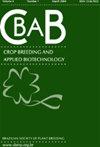Bayesian segmented regression model to evaluate the adaptability and stability of maize in Northeastern Brazil
IF 1.1
4区 农林科学
Q3 AGRONOMY
引用次数: 0
Abstract
Although maize is one of the main crops in the Northeast region, yield is still considered low when compared to other regions. One of the main solutions to increasing yield is the selection of cultivars adapted to the conditions of the Northeast region. Thus, the present study aims to use the Bayesian segmented regression model to evaluate the adaptability and stability of maize. The experiment was set up in a randomized block design with two repetitions, where 25 maize hybrids were evaluated in different states. Initially, the analysis of variance was performed. Then, the Bayesian approach of the segmented regression method was used to select the hybrids regarding adaptability and stability. There was a difference between the genotypes indicated using the a priori distribution and those indicated by the minimally informative a priori distribution. Hybrids 20A55HX, 2B433HX, 2B512HX, and P2830H were considered ideal for the Northeast region.巴西东北部玉米适应性与稳定性评价的贝叶斯分割回归模型
虽然玉米是东北地区的主要作物之一,但与其他地区相比,产量仍然很低。选择适合东北地区条件的品种是提高产量的主要途径之一。因此,本研究旨在利用贝叶斯分割回归模型对玉米的适应性和稳定性进行评价。试验采用2次重复的随机区组设计,对25个玉米杂交种在不同状态下进行评价。首先,进行方差分析。然后,采用分段回归方法中的贝叶斯方法对杂种进行适应性和稳定性的选择。使用先验分布指示的基因型与最少信息先验分布指示的基因型之间存在差异。混合动力车20A55HX、2B433HX、2B512HX和P2830H被认为是东北地区的理想选择。
本文章由计算机程序翻译,如有差异,请以英文原文为准。
求助全文
约1分钟内获得全文
求助全文
来源期刊

Crop Breeding and Applied Biotechnology
AGRONOMY-BIOTECHNOLOGY & APPLIED MICROBIOLOGY
CiteScore
2.70
自引率
13.30%
发文量
25
审稿时长
6-12 weeks
期刊介绍:
The CBAB – CROP BREEDING AND APPLIED BIOTECHNOLOGY (ISSN 1984-7033) – is the official quarterly journal of the Brazilian Society of Plant Breeding, abbreviated CROP BREED APPL BIOTECHNOL.
It publishes original scientific articles, which contribute to the scientific and technological development of plant breeding and agriculture. Articles should be to do with basic and applied research on improvement of perennial and annual plants, within the fields of genetics, conservation of germplasm, biotechnology, genomics, cytogenetics, experimental statistics, seeds, food quality, biotic and abiotic stress, and correlated areas. The article must be unpublished. Simultaneous submitting to another periodical is ruled out. Authors are held solely responsible for the opinions and ideas expressed, which do not necessarily reflect the view of the Editorial board. However, the Editorial board reserves the right to suggest or ask for any modifications required. The journal adopts the Ithenticate software for identification of plagiarism. Complete or partial reproduction of articles is permitted, provided the source is cited. All content of the journal, except where identified, is licensed under a Creative Commons attribution-type BY. All articles are published free of charge. This is an open access journal.
 求助内容:
求助内容: 应助结果提醒方式:
应助结果提醒方式:


